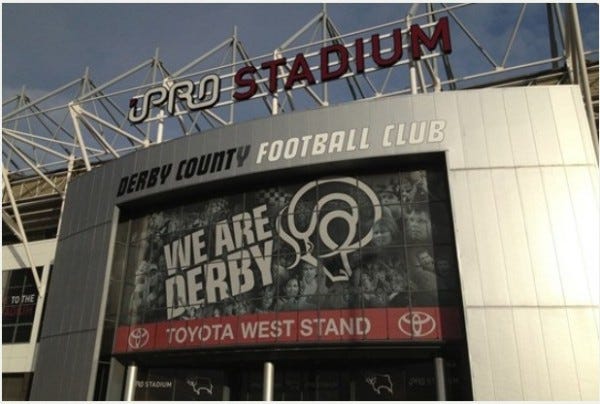Archive: Has sponsorship in football gone too far?
The drama-filled 90-minutes I endured as Derby County edged out Sheffield Wednesday 3-2, took them to the top of the Championship. As a fan it was draining to watch, but long-term its an excellent result so it allows us to move on and focus on the next game.
Away from the pitch, however, it was marketing that caught my eye. Specifically the sponsorship of the latest scores at half-time by WeWantAnyCar.com, one of the multitude of companies that launched following the success of WeBuyAnyCar.com.
Applying purely business logic, there is plenty of sense to this arrangement. Those fans who haven't disappeared into the concourses want to know the latest scores so they can work out Derby County's live league position. The club therefore displays the Championship scores, followed by the Premier League (because of its unavoidable influence) and League Two because of local affinity for Burton Albion. All in all, gaining a high number of impressions for the brand.
But, the one thing that football isn't, is logical. So when the advert above was shown, I must admit it did take me by surprise. A sense of, 'What are they going to sell next?' To give you an idea where that opinion comes from, you have to take into account what else is sponsored on a match day:
Shirt - front
Shirt - back, above the name and number
Stadium
Four stands and two corners
Team news
Ball delivery
Injury time
Substitutions
Fan-cam
The list isn't exclusive either, as the brands who sponsor the above make up a total of 96 official, preferred and proud partners.
A huge number.
We've come to accept shirt, stand and whole stadium sponsorship as the norm in modern football, but when you see brands associating themselves with substitutions or injury time, it's difficult not to think it's all gone too far. Certainly, the older generation of football fans see it as the sport losing its soul to the corporate world.
To be honest, even stadium sponsorship took some people a while to accept. Just look at the mixed reaction when Derby announced it was renaming Pride Park to the iPro Stadium. I even wrote a blog on the matter at the time.
However, in my view it's the way of the world and we have to accept these developments. Some may seem daft, but ultimately they're new revenue streams, allowing the club to maximise income to spend on transfers and wages as well as adhere to Financial Fair Play regulations (download the full document here). All with the aim of reaching the promised land where the real money comes in, the Premier League.
Perhaps the last taboo for commercialism to break in English football is the naming rights to the club itself.
Historically and oft forgotten by football fans, a number of clubs do have direct links with business.
In the UK, the forebears to Manchester United and Arsenal were formed by workers from Lancashire and Yorkshire Railway and the Royal Arsenal respectively. So company naming has been done in the UK, just not in the way we think of it today.
In Germany, VFL Wolfsburg was founded by Volkswagen staff, while workers from chemical giant Bayer AG started Bayer Leverkusen. Comparatively, in the Netherlands, technology firm Philips formed PSV Eindhoven as a means of offering employees leisure activities.
Team sponsorship does exist, with the prime example being Red Bull as part of it's global marketing strategy. It's football teams include RB Leipzig, NY Red Bulls, Red Bull Brazil and FC Red Bull Salzburg.
In the UK, team sponsorship was most recently proposed by Assem Allam in his attempt to rename Hull City to Hull Tigers, an application which was ultimately rejected by 63.5% of FA Council members.
This kind of activity is only ever going to increase.
It therefore raises one final question to ponder, who will be the first to succeed in the UK?




